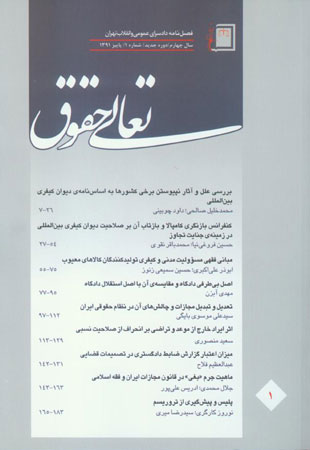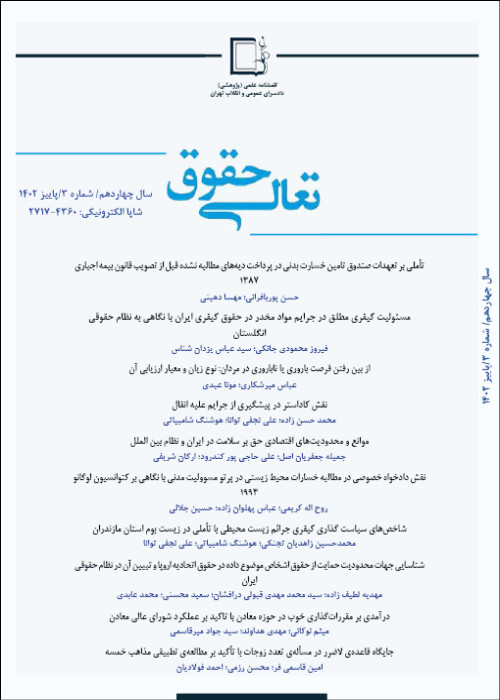فهرست مطالب

نشریه تعالی حقوق
سال چهارم شماره 4 (پاییز 1391)
- تاریخ انتشار: 1391/12/20
- تعداد عناوین: 9
-
-
صفحه 165
-
Page 7One of the challenging subjects in political and legal matters is the accession to the statute of the international criminal court (ICC). the most significant reason of the failure of states to adhere to the statute is their concern over the interference of the security council as contained in articles 13 and 16 of the statute. The other reason behind this reluctance is the non-immunity of the highranking heads of states for the commission of the crimes during their terms of office. Since non-accession would not release the governances from the imposition of political pressures and the exercise of the jurisdiction of ICC because of the fact that nearly ninety percent of the substantiye provisions of the court entering into the common Low has turned to a mandatory rule in international law; Therefore the states shall, by making the appropriate mechanisms, criminate the crimes within the jurisdiction of the ICC and use the legal tricks like making declaration appendixed to the accession documents to the way for adherence.Keywords: international criminal court, accession, complementary jurisdiction, the security council
-
Page 27The Review Conference of the Statute of International Criminal Court was held in Kampala, Uganda (May 31 to June 11, 2010). Finally State Parties adopted a Resolution on the Crime of Aggression. By this agreements, based on the Provisions of Resolution 3314 of the UN General Assembly, it was agreed that regardless of the membership of the state in question to the statute of the ICC, the agression situation shall, in accordance with chapter VII of the charter of the United Nations, be Referred to ICC by the Security Council. The definition of the crime of aggression, and determining the conditions under which ICC shall have Jurisdiction and, in general, including this Crime in the Statute an improvement in putting an end to the immunity of the designers and perpetuaters of aggression. However, certain ambiguities surrounding the definition as well as such limitations as delaying Enforcement of ICC s Jurisdiction on this Crime until 2017, as well as allowing the Security Council to play a part in Determination of the act of Aggression, makes some problems that would be dealt with in this contribution.Keywords: Crime of Aggression, International Criminal Court, Security Council, Kampala Review Conference, Resolution on the Definition of Aggression, Determinition of Act of Aggression
-
Page 55The present century is being industrialized day by day and many people are taking action to produce industrial products in an enormous amount with commercial goals and this enormous amount of products will naturally lead to the harmful results that originated from consumption of these products. In recent years, the governments, with an interventional approach and in order to support the consumers, have attempted to legislate the compulsory and protective acts. At classical law, the principle of freedom of will and fault principle were the bases of the liability of producers. The intricacy and difficulties of proving fault and harmful effects of consumption of industrial products caused to accept the Criminal Responsibility of producers whitout Proving negligence during the producing process. This Article intends to create an efficient criminal policy to react against the guilty producers based on the Islamic jurisprudence sources.Keywords: Producers, Defective Goods, Criminal liability, Civil liability (Tort)
-
Page 77One of the criteria of “fair trial” is the “court neutrality” that alongside the court independence are considered fundamental for assessing the congruancy of laws of a state with human rights norms and standards. The purpose neutrality is that a court, within the framework of laws and negulations and based on the call of conscience, without predjudice to either of the parties to an action judicially analyse and describe the case. Neutrality principle requires evidence and absoluteness based on the psychological, moral, canonical, legal and social fundamentals and the general rules of justice and equity. The concept of judicial independence is based on the principle of separation of powers that by its virtue the judicial system shall make decisions and execute its judgments independent of other powers. This contribution deals with the two principles of neutrality and independence of the court, and discusses their differences. In sum, the concepts of neutrality and independence one different and they could be separated in terms of nature and characteristics.Keywords: Neutrality Principle, Independence Principle, Due Process, Human rights
-
Page 97The last part of Article 22 of the Islamic Penal Code 1370, (1991) provides for an important institution inwhich in specific conditions; the judges are empowered to change the definite legal punishment to a more suitable punishment convenient to accused to play an efficient role in criminal justice system. Despite of great importance of this institution in terms of the principle of legality, it has some challenges. The lack of integrated rules and regulations in question has made the judges perform that by their self-touchstone in different ways. The subject of this contribution is to examine the challenges in punishment adjustment and conversion and how to correctly perform that in both quality and quantity aspect and in both legislation and criminology area. Moreover the effective factors of applying this article will be analyzed and examined.Keywords: Punishment Adjustment, Punishment Conversion, Individual Punishment, Penology, the Principle of Legality
-
Page 113The General and Revolutionary Courts Civil Procedure Code, 1379 (2000) does not define the relative Jurisdiction and only the term “local Jurisdiction” is used. Those articles associated with Jurisdiction, objection to the Jurisdiction and duty of the judicial authority to determine its own Jurisdiction, faced with uncertainty; like the Article 352 of this Code Provides for nonjurisdiction of the court among the causes quashing the judgement at the appellate stage, without referring to jurisdiction as being relative or inherent. while para. 1 of Article 371 laid down this differenciation in appellate proccedings according to this article if until the end of deadline referred to in Article 87 objection to the relative Jurisdiction there supplies no causes for the reversal of judgment. There are other questions such as the possibility of mutual consent contrary to the rule of relative jurisdiction to which this contribution is supposed to answer.Keywords: Relative Jurisdiction, Intrinsic Jurisdiction, Local Jurisdiction, Compromise Unlike Jurisdiction of the Courts, Objection to the Court's Jurisdiction
-
Page 131During Criminal proceedings, the judicial authority interacts with administration of justice`s executives in different aspects. One of the important areas of this interaction, is crediting the Law Enforcement Officer’s comments and reports by judicial authority. The Law Enforcement Officer’s reports and commentshave enacted different contents and types, consequently the law markers have different laws regarding them. In some cases, the reports credibility is dependent upon the Judge's approval and in some other instances they are among the judicial presumptions. The Law enforcemonl officers’ specialized technical reports, such as traffic officers` reports concerning traffic accidents, police departments’ laboratory criminal reports, the reports of specialized officers regarding the types of weapons or bullets and the reports of finger print specialists and identification experts ` reports, are as creditable as expertise. Among the deficiencies of jurisdical laws and regulations, we can mention the law makers` non-emphasis on non-reliability of reports which are prepared by illegal and unauthorized methods.Keywords: Law Enforcement Officer, Judicial Report, Judicial Presumptions, Expertise
-
Page 143
In spite of religious reasons and documentary evidences on crimes against public security and peace of the citizens, there is a sort of ambiguity in the aforementioned evidences about the crimes of ‘Moharebeh’ (waging war against Allah) and ‘Baghy’ (political crime) which has led to different interpretations about these two crimes (namely Moharebeh and Baghy). After the foundation of the Islamic Republic of Iran, in executing Article Four of the Constitution for ‘Islamizing’ the laws and the necessity for expanding the scope of security concept, the crime of ‘Baghy’ was brought under focus as an act against the government’s sovereignty. This crime was not entered the Islamic Penal Code with the same name (Baghy). But with respect to the criminalization of Moharebeh and Efasad fi al- Arz (literally corruption and deterioration on Earth) in the aforementioned Code, distinguishing these two criminal issues from Baghy is necessary. The present study aims at discussing Baghy and its constituent parts.
Keywords: Baghy, Political Offence, Moharebe (Waging war against Allah) Efsaad Fi al Arz (Corruption, deterioration on Earth) -
Page 165It is becoming clear that the police have an important role in preventing terrorism. They are in a good position to learn about and investigate local terrorist threats, and they can work to ensure that vulnerable targets in their jurisdictions are protected. Filling the first of these functions, investigation of terrorists, will require police to extend their normal community policing activities and improve their handling of information. Filling the second function, protecting vulnerable targets, will require greater adjustments. They will need to become more expert in crime prevention and security matters, and they will have to develop partnerships with businesses and a wide range of public and private agencies. However, these changes are consistent with current best practices in policing.Keywords: Police, Prevention of Crime, Terrorism, Citizen's Report, Private Organization, Public Organization


